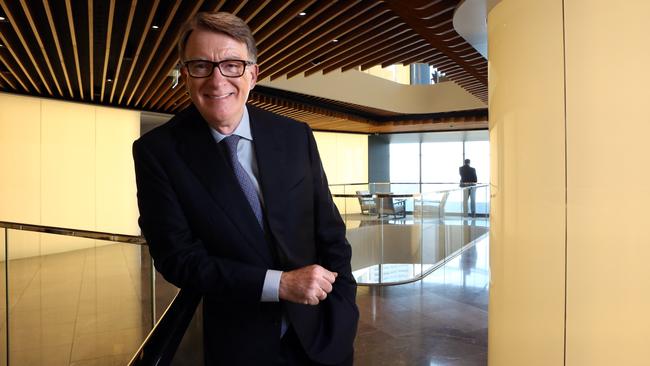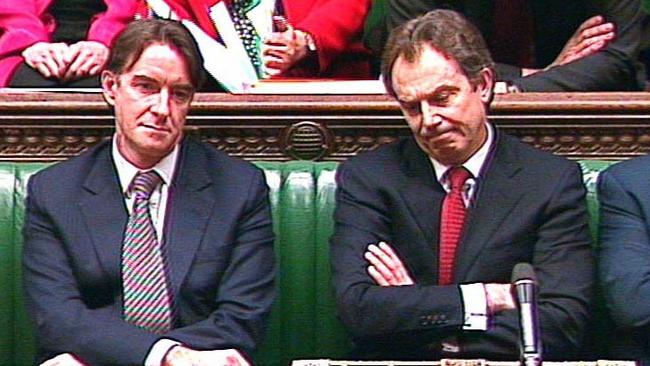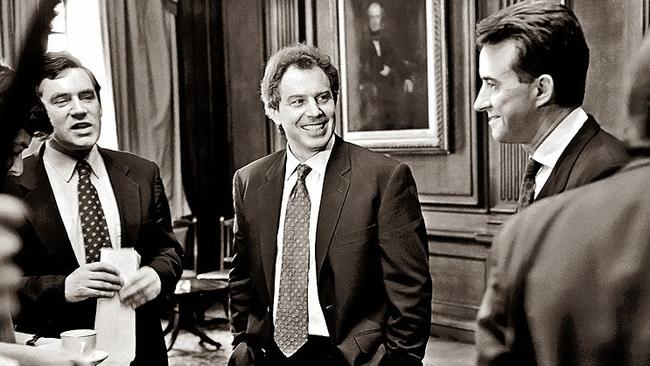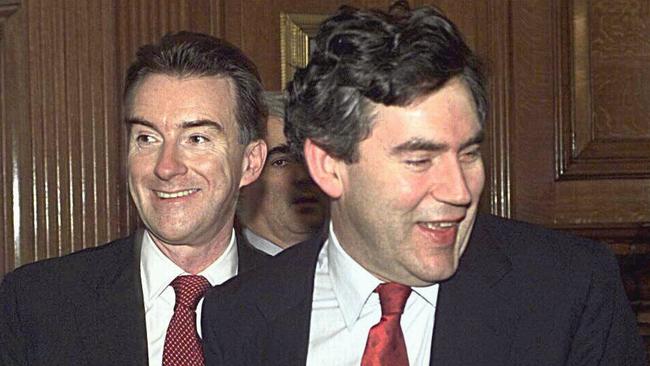
Soon after Peter Mandelson arrived in Australia last week, he received an email from his old boss, Tony Blair. “Do you like Australia?” the former British prime minister asked. “It’s fantastic, isn’t it?”
Blair, like Gordon Brown, visited Australia in the 1980s and 90s to soak up advice on politics and policy from none other than Bob Hawke, Paul Keating and Kim Beazley. The fraternal bonds between Britain’s Labour Party and the ALP have run deep for more than a century.
But Mandelson, the self-described “third man” in the trio that helped to create New Labour in the 90s and a master of the “dark arts” of strategy and spin, has never been to Australia before. And this week he realised he has an Australian pedigree.
“I knew I had Australian ancestry but I wasn’t too sure about it,” Mandelson tells Inquirer. “I asked the (NSW) State Library to look into the records and discovered that my grandfather Norman Mandelson was born in Tumut (NSW) in 1872. So, when can I claim my Australian citizenship?
“Have some sympathy over Brexit refugees,” Mandelson implores. “I’m willing and able. I have a skill set. I have something to contribute. So don’t reject me out of hand. I know you have a problem with politicians involving nationality, but if I promise not to run for election here, would I receive a welcome?”
I assure him that he would.

Mandelson is in Australia as a guest of Herbert Smith Freehills. He is also keen to establish a local footprint for his advisory firm, Global Counsel. A magnet for controversy but immensely charming in person, Mandelson spoke to Inquirer this week about Blair, Brown, his ministerial career and the state of British politics.
Mandelson was born into the Labour Party. His other grandfather, Herbert Morrison, served as home secretary in Winston Churchill’s wartime government and as deputy prime minister in Clement Attlee’s postwar Labour government. He remembers meeting Attlee and Harold Wilson on a visit to Downing Street as a boy in 1965.
In the 90s, he was often described as “the prince of darkness” for his cutting-edge campaign techniques, finetuning the art of political spin and Machiavellian plotting. He was close to both Blair and Brown but in 1994, following the death of Labour leader John Smith, he backed Blair to lead the party. “It was hard because both were my friends and I was equally committed to them,” he says.
“There was a presumption on Gordon’s part and those around him that he would follow, but not for one nanosecond was Tony accepting that. In the end, the party, the trade unions, as well as the public, clearly wanted Tony.”
Managing the Blair-Brown relationship in government was an energy-sapping enterprise. This is documented in his memoir, The Third Man, published in 2010. Mandelson helped negotiate the deal between Blair and Brown struck at Granita, a restaurant in Islington, London, in 1994.
The deal gave Brown a big say in policy in return for allowing Blair a clear leadership run. Mandelson now believes an open leadership contest, with a Blair victory certain, may have been better. Brown was left feeling he had been “unfairly pushed aside”. The tension between him and Blair never subsided.
It is two decades since Blair, Brown, Mandelson and others such as Alastair Campbell and Philip Gould transformed Labour and won government in a landslide. “Hope, freshness, new beginning and Blair” were, in short, the key elements in the victory, Mandelson says.
But the genesis of New Labour began a decade earlier during Neil Kinnock’s leadership. In 1985, Mandelson was appointed Labour’s communications director. He worked alongside Kinnock as campaign manager for the 1987 election before winning a seat in the House of Commons — Hartlepool — in 1992.
“He saved the Labour Party in the 1980s from itself,” Mandelson says of Kinnock. “That was the last near-death experience we went through and with great courage, great determination, he turned things around and created the foundations, the platform, for what we did subsequently.”
The success of New Labour was more than just clever campaigning, a shrewd media strategy and fresh-faced leadership. The key was moving the party to the centre. As Blair told me last year, they focused on the future, adopted practical policies that embraced aspiration and equality, and were about winning power rather than being a protest party.

Mandelson held several portfolios in government, including business, trade and Northern Ireland. He was sacked twice by Blair after being embroiled in scandals but bounced back both times. In 2008, after four years as European trade commissioner, Mandelson was invited back into the cabinet by Brown and given a seat in the House of Lords. Some Blairites still have not forgiven him for returning to help Brown ahead of the 2010 election.
“They viewed him as a huge liability,” Mandelson says. “I had one or two people subsequently accuse me of propping him up. That is ludicrous. When the prime minister asks you to come back and serve the country, you do.”
While the party won three back-to-back elections and held office for 13 years, New Labour is dead. Mandelson looks at Jeremy Corbyn’s leadership, and the takeover of the party membership by militants, as a tragedy. He says the blame rests not only with Corbyn but with his predecessor, Ed Miliband, and also Brown.
“Tony, like all of us, assumed the roots of New Labour had gone so deep into the party that no one could tear them out,” Mandelson says. “When he was succeeded by Gordon, New Labour became blurred in what it stood for. He was succeeded by Ed, who set about discrediting New Labour and delegitimising it. He paved the way for Jeremy, who buried it.”
“I’m not saying we can turn the clock back. I’m not an idiot. But there was a certain ethos associated with New Labour — a broadly based coalition with values and a competence — that the public wanted to vote for. We have not been offering them the same since Blair went.”
Mandelson does not exempt himself from blame for failing to cement New Labour.
“I’m not saying that everything that Blair did was faultless,” he concedes. “I’m not saying we got the politics of globalisation exactly right. I think the economics were correct and we certainly did a huge amount to give people to a fairer share of the fruits of globalisation.
“But we should have recognised that when the growth started to abate the inequalities would become starker and leave us vulnerable to the criticism that we were indifferent to them or didn’t care enough about them.”
This is what Corbyn has understood and exploited. Ahead of the election this year, Mandelson said Corbyn would not lead Labour to victory. He was right about that but Labour’s success in lifting its vote to 40 per cent and gaining 30 seats cannot be discounted.
“We would have coasted into office with a different leader and different policies,” an unrepentant Mandelson says.
“The reason why people think he did so well is because their expectations were so low and because his affability and charm contrasted so starkly with the one-dimensional Theresa May.”
With Corbyn’s grip on Labour tightening and even The Economist declaring he is likely the next prime minister, Mandelson is no longer agitating for his overthrow. But he still doubts whether he can win government.
“He has to ask himself whether he is the barrier to Labour replacing the Tories at the next election,” Mandelson says. “Labour is ahead of the Conservatives in the polls, but he trails May, who is probably the most underwhelming occupant in No 10 in living memory.”
Mandelson also doubts Corbyn has the answers to the social and economic challenges that have engulfed politics around the world. The challenge for the centre-left, including Australian Labor, is to steer to the centre but reinvent themselves for a new age.

“We’re losing because we are standing up for the status quo,” Mandelson says. “People want change, they want something new, something fresh, they want something radical, albeit credible, and they want to get a fairer deal. We will not renew the centre ground on the left unless until we paint a fresh picture of the future.
“It has to be a radical centre. There’s an appetite for more radical policies simply because people are angry and disappointed that in an age of globalisation there are groups and individuals who are taking advantage of everyone else and are not applying the rules fairly to themselves.
“This sense of fairness has become the dominant thought in politics now. It is not just fair shares, it is fair rules. What people will not stand for is a small minority of privileged or powerful people who can bend the rules and get away with advantages which are unmerited and undeserving. That is what makes people cross, and governments have got to address that.”
Today, British politics is in turmoil. May — who had a train wreck of a speech at this week’s Conservative Party conference — is regarded as “the living dead”. Mandelson says she can’t survive. But with the government divided over Brexit, it is hard to see who would make a better fist of it.
“She won’t lead her party into the next election,” he says. “If the cabinet carry on as they do at the moment, the government will fall and there will be an early election. Their current approach to Brexit is unsustainable.”
Blair once said — tongue in cheek — his mission would not be complete until Labour learned to love Mandelson. “I was pretty loved in 1997 after the election victory, less loved in the years after, more loved when I came back to government when the financial crisis struck,” Mandelson says.
Machiavelli thought “it is far better to be feared than loved, if you cannot be both”. But Mandelson has not given up hope. He says he is loved “by fair-minded people who like the idea of the Labour Party in principle, also as a broad church, and who want us to win”. It is hard to argue with that.




To join the conversation, please log in. Don't have an account? Register
Join the conversation, you are commenting as Logout